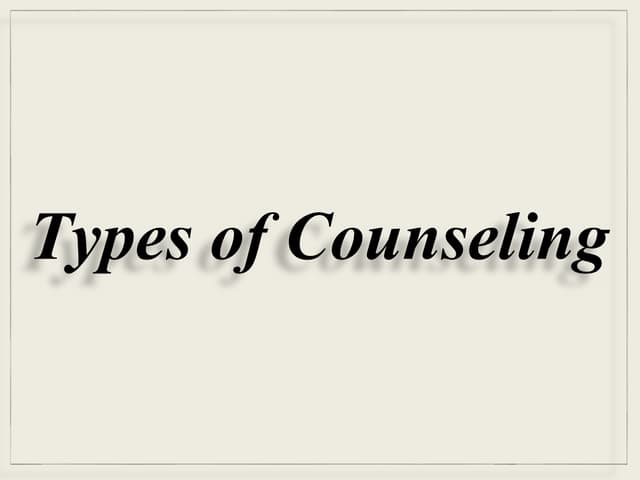A Comprehensive Guide to the Different Sorts Of Counselling and Their Impact
Counseling includes a variety of therapeutic approaches, each designed to fulfill one-of-a-kind mental wellness needs. From the organized methods of Cognitive-Behavioral Therapy to the understanding nature of Person-Centered Treatment, these modalities offer distinctive paths to individual development. Household therapy and Dialectical Behavior modification give added frameworks for healing, while team therapy promotes community assistance. Recognizing these varied approaches can brighten their profound influence on individual well-being. What continues to be to be explored are the intricacies of each method.

Recognizing Cognitive-Behavioral Therapy (CBT)
Although many therapeutic methods exist, Cognitive-Behavioral Therapy (CBT) sticks out because of its structured, goal-oriented nature. This form of therapy is based upon the property that ideas, feelings, and actions are interconnected, and by transforming adverse thought patterns, individuals can change their psychological feedbacks and activities. CBT uses numerous techniques, such as cognitive restructuring, which helps customers determine and challenge distorted beliefs. Behavior activation urges interaction in pleasant tasks to deal with clinical depression.
Typically, CBT is a short-term treatment, usually long-term between 12 to 20 sessions, making it obtainable for those seeking quick outcomes. Its performance has actually been well-documented in treating stress and anxiety conditions, depression, and other psychological health issues. The specialist's function is to lead clients through exercises and research projects, promoting self-awareness and promoting long-lasting coping strategies. This functional approach empowers individuals to take control of their psychological wellness, ultimately leading to enhanced life contentment.
Discovering Person-Centered Therapy
Person-Centered Treatment, established by Carl Rogers, provides a contrasting strategy to Cognitive-Behavioral Treatment by highlighting the customer's subjective experience. This therapeutic version focuses on the person's point of view, fostering a setting of empathy, unconditional favorable respect, and credibility. By permitting clients to explore their feelings and thoughts without judgment, therapists help with individual growth and self-discovery.
The core tenet of Person-Centered Treatment is the idea that people have the integral ability for self-healing and personal advancement. In this setting, the specialist acts as a helpful guide rather than an instruction authority, encouraging customers to organize their very own journey. This strategy is specifically reliable for those facing problems such as reduced self-confidence, stress and anxiety, or depression, as it encourages them to challenge and understand their emotions. Eventually, Person-Centered Therapy grows a strong healing partnership, fostering trust fund and visibility essential for meaningful adjustment.
The Function of Family Members Treatment in Recovery
Family members treatment serves as a crucial component in the healing process for people and their partnerships. This healing technique focuses on boosting communication, resolving conflicts, and cultivating deeper connections among relative. By attending to dysfunctional dynamics, family therapy encourages each participant to share their ideas and sensations in a secure atmosphere, advertising understanding and compassion.

The effect of family treatment expands beyond the sessions, as boosted connections can lead to enhanced psychological health for all included. In general, family treatment plays an essential function in recovery by cultivating unity, resilience, and shared assistance amongst relative, inevitably guiding them toward a healthier, much more fulfilling life together.
Unloading Dialectical Behavior Modification (DBT)
Structure on the structure of healing methods that boost psychological well-being, Dialectical Behavior modification (DBT) provides an organized framework for people battling with extreme feelings and behavior obstacles. Created by Marsha Linehan, DBT integrates cognitive-behavioral methods with mindfulness methods, intending to help customers handle overwhelming sensations and improve interpersonal efficiency.
The therapy is especially advantageous for those diagnosed with Borderline Personality Problem yet is additionally suitable to a series of various other mental health concerns. low cost therapy. DBT includes specific therapy sessions and abilities training groups, concentrating on 4 key capability: mindfulness, distress resistance, emotion law, and social effectiveness
The Advantages of Group Coaching Sessions
While individual therapy offers important insights, group therapy sessions use unique benefits that can substantially enhance the healing experience. One crucial benefit is the sense of neighborhood that arises among participants. People typically locate comfort in sharing their experiences with others dealing with comparable challenges, fostering a helpful setting that reduces sensations of seclusion.
Team sessions motivate varied perspectives, permitting individuals to learn from each various other's coping methods and insights. This collective knowledge can result in enhanced analytic capabilities and a more comprehensive understanding of personal concerns.
Additionally, team counseling often promotes responsibility, as participants inspire one another to seek their goals and stick to their commitments. The cost-effectiveness of group therapy makes it an accessible choice for lots of people looking for support. In general, the joint nature of group therapy sessions can significantly enrich the relationship therapy restorative trip.
Often Asked Inquiries
What Qualifications Do Therapists Required to Practice Counseling?
Specialists commonly require an appropriate level in psychology or therapy, along with monitored professional experience. Furthermore, they need to acquire ideal licensure or qualification to practice legally, making certain adherence to professional standards and honest guidelines.
Just how Do I Choose the Right Sort Of Therapy for Me?
Selecting the ideal sort of therapy includes examining individual requirements, exploring various techniques, thinking about therapist specializeds, and seeking referrals. Understanding individual goals and preferences can greatly improve the performance and complete satisfaction of the restorative experience.

Are Online Therapy Sessions as Effective as In-Person Ones?
The performance of on-line counseling sessions contrasted to in-person ones typically depends on specific preferences and conditions. Research shows that both approaches can generate favorable results, though some might discover higher convenience in face-to-face communications.
Just How Lengthy Does Therapy Normally Last?

What Should I Expect During My Initial Counseling Session?
During the very first counseling session, customers can anticipate an intro, conversation of their concerns, establishment of goals, and an introduction of the therapy procedure - low cost therapy. This preliminary conference intends to construct relationship and warranty comfort